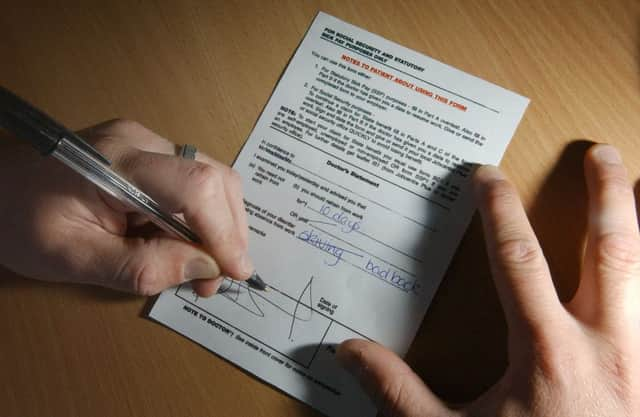Between the lines: How to beat '˜14-day sickies'


Under the current system, an employee can self-certificate for absences from work for up to seven days (including weekends). Where the absence extends beyond that, he or she is required to provide a “fit note” from the appropriate GP certifying an unfitness for work.
The rationale behind the proposal is to free up valuable GP time to focus more appointments on people with acute or chronic conditions. This is on the basis that a large number of current appointments are taken up with employees who have reached the end of the current seven-day self-certificated period but who remain unfit for work and require a GP to sign a “fit note” to cover the period until they are well enough to return.
Advertisement
Hide AdAdvertisement
Hide AdMore cynical employers might take the view that doubling the period available for self-certification also doubles the scope for abuse of the system and doubtless there are bosses who see regular patterns of absence with employees returning to work just before the requirement to visit the doctor for a fit note is triggered. But this will be balanced by the many hard-working, conscientious employees who beat themselves up about using a rare sick day.
What practical significance would a move to 14-day self-certification have?
To start with a common problem, 14-day self-certification is unlikely to make any impact on shorter absences, for example, in respect of ‘Mr or Mrs Friday night/Monday morning’ who pulls a sickie due to a hangover.
However employers could prevent or minimise other forms of abuse by requiring employees to personally telephone their line manager or HR department before their allotted start time on each day of self-certification to detail the reason for the absence and provide an update on their expected return to work. Employers should also keep track of their sick pay provisions – an employee who is entitled only to the minimum statutory sick pay (currently £88.45 per week) is less likely to take a two-week sickie than a colleague on full pay.
Another point for employers to note is that 14-day self-certification will not prevent them taking disciplinary action against malingerers. Dishonesty is potentially misconduct .
In a recent case, which went before the Employment Appeal Tribunal, an employer was judged to have fairly dismissed an employee for lying about the reasons for absence, even where the employee’s absence was backed up by an occupational health report.
So Scotland’s bosses should be able to live with 14-day self-certification, but all of them would be advised to review their absence-management and disciplinary procedures.
• Jack Boyle is an associate with law firm Blackadders